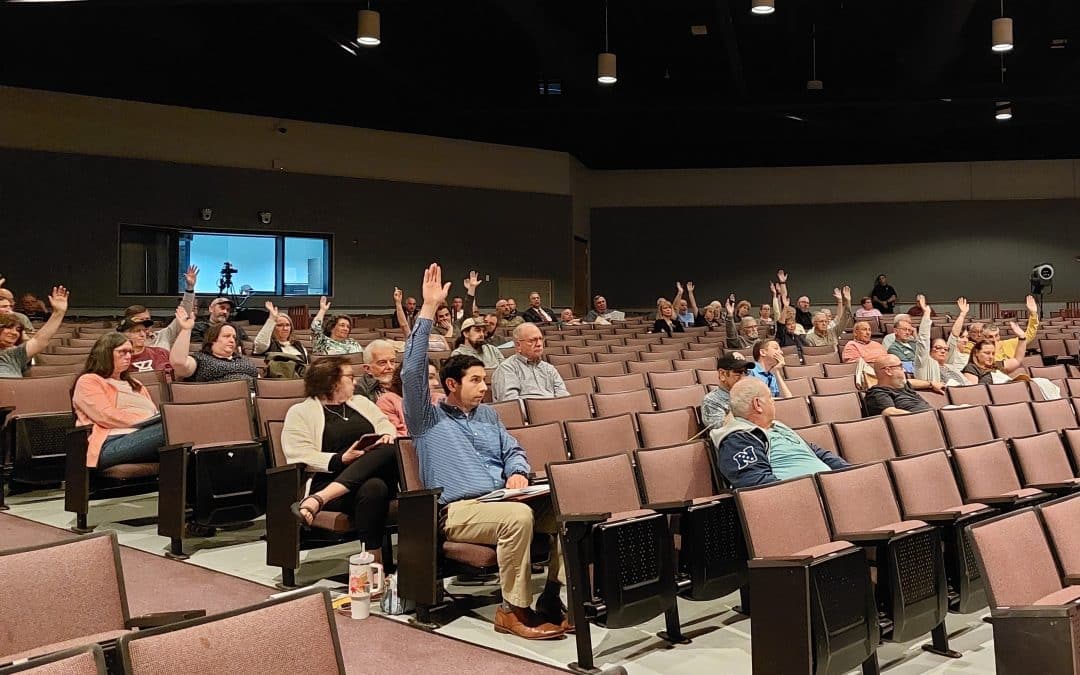Voters at the May 13 Ludlow Town Meeting vote on the budget.
Reminder Publishing photo by Sarah Heinonen
LUDLOW — Ludlow’s May 13 Town Meeting featured vigorous debate on a few of the 35 articles, splitting the voters and requiring standing counts.
The budget was the first contentious topic of the evening. The $84.15 million budget for fiscal year 2025 included a 3% increase to the School Department, despite the School Committee having requested 3.4%.
Multiple residents came to the microphone to express outrage that the schools were not being funded to keep up with costs. One person asserted, “3%’s not going to cut it.”
Town Administrator Marc Strange explained that the town is limited in what it can raise through taxes due to Proposition 2½, a state law that prohibits municipalities from raising the property tax levy beyond 2.5% per year, plus new tax growth. Other towns in the area funded their needs with increased revenue through eliminating trash collection or having their employees shoulder more of their health insurance costs.
“We cannot continue to use free cash to pay our operating budget,” Strange said, referring to allocated funds from previous years that remained unspent. Municipalities usually reserve free cash for one-time expenses because it is not a reliable source.
“Those kids who didn’t go to school for two or three years deserve more from this town,” a voters said. Another said, “This is not a balanced budget,” and added that the town has a “spending problem.”
Board of Selectmen Chair Derek DeBarge told residents that the town’s revenue has been hurt by contractual salary increases and new positions. He said Ludlow is behind other towns in the salaries it offers, infrastructure and technology. “This is where progress needs to be made,” he said. He also said the town could raise trash fees or regionalize emergency services, but neither of those are popular among residents.
Strange made the case that the town was saving money where possible. He said Ludlow is “operating on minimal staff,” with services outsourced when possible. The health insurance increases for employees were negotiated down from $680,000 to $500,000. Strange stated, “The only solution is free cash or a Proposition 2½ override.”
A resident encouraged voters to reject the budget, which resulted in a round of applause. When the vote on the budget was called, it passed by just two votes: 33-31.
Selectman Antonio Goncalves urged people at the meeting to attend the budget meetings in the months ahead of next year’s Town Meeting so they would be familiar with the budget before arriving at the meeting. Resident Kelly Caminos took issue with what she called the characterization of voters as “unprepared.” Planning Board Chair Raymond Phoenix agreed that the comment had been unwarranted.
Article 28 was an amendment to the animal control bylaw that would change many of the references to “dogs” to “animals.” Several residents came to the mic to decry the bylaw amendment as an effort to raise revenue through licensing non-canine pets, such as cats and birds. “We’re now going to have leash laws for cats?” a voter asked, rhetorically. Someone else complained that they would be made to pick up cat waste around the neighborhood.
Police Chief Daniel Valadas, who is the authority over the animal control officer, explained that the changes “streamline best practices,” and was “not a government overreach looking for license fees.”
The animal control officer’s supervisor addressed the voters, saying the amendment would help deal with the “feral cat problem.” Phoenix quipped, “We also have a rat problem. Maybe having the cats around would help.”
This article also required a standing count, with the town clerk and two student volunteers manually noting how many people were “for” and “against.” Fewer people voted on this issue, and the matter failed with a final tally of 26-31 against.
The third article to require a standing count was Article 31, which would have codified rules stating that no fence, planting or other substantial item more than 3 feet tall could be placed within 25 feet of an intersection or within a triangular area of 25 feet on either side of a driveway and 10 feet from the curb.
Phoenix noted three separate times at the microphone that pre-existing structures and items would be exempt, but a couple of residents were concerned that 100-year-old trees would need to be torn up and mailboxes would have to be moved. The two-thirds vote required to pass the bylaw change passed, but just barely, with 39 people in favor and 19 against.
One other article sparked several questions and comments from voters. Article 21 requested the Board of Selectmen be given the authority to enter into a pay-in-lieu-of-taxes agreement with a company that wants to locate a better storage facility on Center Street. The facility would store energy from local solar arrays until it needs to be fed into the grid.
Despite only pertaining to the negotiation of a PILOT agreement, residents spoke against the article because of the potential facility’s proximity to the town’s drinking water source and the cost of equipment to put out battery fires. One person commented that Ludlow was changing and cited affordable housing and a cannabis processing company as evidence of this.
Goncalves reminded voters of the scope of the article. Debarge said a PILOT agreement would result in a “substantial” amount of revenue — $1.2 million per year — as opposed to the steadily depreciating tax value of the facility’s equipment. He also said meeting with the company had “put his mind at ease” about many of the same concerns residents had.
Phoenix explained that the use was not allowed under current zoning bylaws, but the Planning Board hoped to present a bylaw regulating the use at the Town Meeting in October. The article passed, as did the rest of the warrant.


